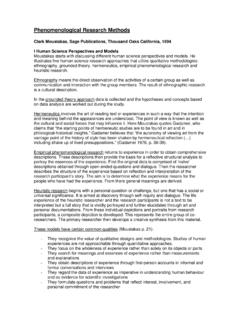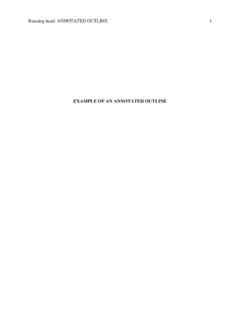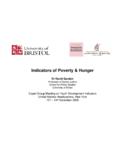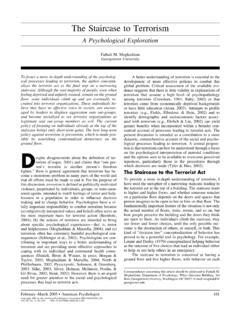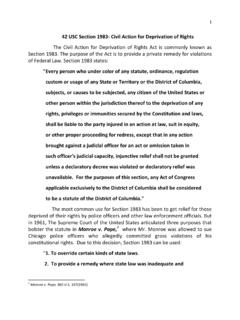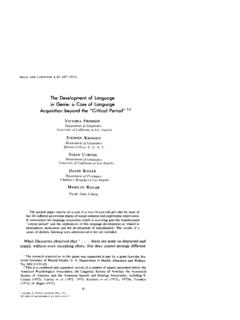Transcription of The Effects of Sleep Deprivation on Memory, Problem ...
1 The Effects of Sleep Deprivation on memory , Problem solving , and critical thinking 1 The Effects of Sleep Deprivation on memory , Problem solving and critical thinking An Ex-Post Facto Experimental Study Matthew Schumacher and Desmond Sipes Psychology 211 Research Methods for the Behavioral Sciences Northern Virginia Community College, Loudoun Campus Dr. Rosalyn M. King, Professor May 2015 The Effects of Sleep Deprivation on memory , Problem solving , and critical thinking 2 ABSTRACT The main focus of this research was to obtain a deeper insight of the negative implications Sleep Deprivation had on particular cognitive functions. The research aimed to assess the correlation, if any, Sleep Deprivation had on critical thinking , Problem solving skills, and short-term memory of college students.
2 The purpose was to gain new information, which would better inform college students of the importance of routinely obtaining the recommended 7-8 hours of Sleep . The method applied in this research was a simple ex post facto design model along with simple stratified random sampling. The stratum was separated in to two strata of twenty-five male and females per for a total sample size of fifty. The experiment took place on the Loudoun campus of Northern Virginia Community College. The instrumentation used was a Cognitive Function Abilities Assessment. The data failed to support the hypothesis in this experiment. The data supports a conclusion, which makes determining any correlation difficult; however, by accounting for limitations not accounted for initially, better results could be obtained upon conducting the experiment a second time.
3 The Effects of Sleep Deprivation on memory , Problem solving , and critical thinking 3 TABLE OF CONTENTS List of Chapter One Background Problem Statement Purpose of the Study Major Research Question Minor Questions Hypothesis Theoretical Framework Significance of Study Definition of Terms Delimitations of Study Limitations of Study Chapter Two LITERATURE Overview Overview of Research Question Overview of Literature Causes of Sleep Deprivation Effect on memory , Problem solving , and critical thinking Overcoming Sleep Deprivation Research Methodologies and Evaluation of Research Designs Summary Chapter Three RESEARCH DESIGN AND Introduction Overview of Research Design Sampling Design Data Collection Data Analysis Procedures The Effects of Sleep Deprivation on memory , Problem solving , and critical thinking 4 Precautions Taken to Ensure Data Validity and Reliability Limitation of the Research Expected Findings Ethical Consideration Conclusion Chapter Four DATA ANALYSIS AND Overview of Data Analysis Discussion Limitations Discovered Post Experiment Future Research Chapter Five Gaps in Understandings and the Research Summary of Key Findings Implications and Recommendations for Further Study Appendix A.
4 Informed Consent Form Appendix B: Cognitive Function Abilities Assessment Appendix C: Cognitive Function Abilities Assessment Answer Key The Effects of Sleep Deprivation on memory , Problem solving , and critical thinking 5 List of Figures : Simple Ex Post Facto Design : Informed Consent Document : Cognitive Function Abilities : Cognitive Function Abilities Assessment Answer : Bar Graph of Male Student s Test Scores Compared to Number of Hours of : Bar Graph Female Student s Test Scores Compared to Number of Hours of : Bar Graph of Average Test Scores Comparing Male Students to Female Students ..28 : Bar Graph of Average Number of Hours of Sleep Based on Age Comparing Males to Females ..29 : Correlation Charts of Hours of Sleep Compared to critical thinking Test Scores for Males and : Correlation Chart of Hours of Sleep Compared to critical thinking Test Scores for All Participants.
5 31 : Correlation Charts of Hours of Sleep Compared to Problem solving Test Scores for Males and Females ..32 : Correlation Charts of Hours of Sleep Compared to Problem solving Test Scores for All Participants ..33 : Correlation Charts of Hours of Sleep Compared to memory Test Scores for Males and Females ..34 : Correlation Charts of Hours of Sleep Compared to memory Test Scores for All Participants ..35 The Effects of Sleep Deprivation on memory , Problem solving , and critical thinking 6 Chapter 1 INTRODUCTION Sleep is an essential element of the human condition, which allows us to, when obtaining the correct amount, perform critical daily functions at peak optimization. However, the community at large often underestimates Sleep and its importance, therefore leading people to not be as concerned with a proper night s Sleep , thereby preventing them from performing at peak efficiency.
6 Background Sleep is a normal human function that is detrimental to sustaining life yet; individuals are affected differently by their Sleep schedule. There is no doubt that in today s modern world college students are busy individuals. Whether from the grueling demands of regularly assigned homework coupled with major projects assigned from a full schedule of classes, or the boss asking them to stay for just a few hours longer, they are stretched thin. Sleep is a detrimental necessity that when not enough is obtained, a noticeable depreciation in the daily functioning of the Sleep -deprived individual(s) can have a detrimental impact on the adequate performance of certain critical daily functions. When an individual routinely has poor Sleep habits paired with Sleep loss can have a negative impact on one s health.
7 Sleep is important because it has a determining role in your mental and physical health, along with quality of life ( How Much Sleep is Enough , 2012). However, regardless of the reason for one to not receive the proper amount of Sleep it is imperative that individuals, especially college students receive the proper amount in order to avoid depreciation in their ability to Problem -solve, think critically and remember adequately. The Effects of Sleep Deprivation on memory , Problem solving , and critical thinking 7 Problem Statement Everywhere you go, you hear people complain that they are tired and do not have any energy. Students stay up late because they had to work the night before in order to pay for school, they are trying to finish an assignment that is due the next day, there is some sort of issue at home, or they decided they would rather do some other leisure activity they enjoy rather than go to bed at a more appropriate time.
8 However, studies have shown that sleeping is one of the most important things a person can do. Sleep plays a vital role in learning and when a person fails to obtain enough Sleep the night prior, neurons in the brain might not fire properly, the body becomes out of synch, and it can even lead to accidental physical injuries ( Benefits of Sleep , 2007). Students need to learn to be able to put down their computers, turn off the TV, say no to a night on the town, or limit some of their work hours so that they can ensure themselves at least the minimum number hours of Sleep required. Perhaps teachers will even notice a noticeable difference in student performance if all of their students are receiving the appropriate amount of Sleep every night. Purpose of this Study The purpose of this study is to enlighten the community at large of the adverse Effects that a lack of Sleep can have on the human mind.
9 This study will also provide insight as to how much Sleep is necessary each night for adults and the maximum number of hours a person should remain awake before going to Sleep . The data gathered would help people to create a new Sleep pattern that will guarantee peak performance. Major Research Question How does a lack of Sleep impact memory , Problem solving and critical thinking skills amongst college students? The Effects of Sleep Deprivation on memory , Problem solving , and critical thinking 8 Minor Questions What are the differences between genders? What age group will be most affected by Sleep Deprivation ? Is there a point where the skills stagnate after a certain number of hours of Sleep ? Hypothesis College students that obtain between seven to eight hours of Sleep each night will achieve higher scores on the tests administered than those who receive six or less, or nine or more hours of Sleep per night.
10 Theoretical Framework People claim to understand that Sleep is an important aspect of their life, yet they prove their ignorance by refusing to get Sleep , even when they are tired, because they want to get though one more level in a game, read one more chapter, watch one more episode, or have just a little more work to accomplish. Studies have determined that total Sleep Deprivation negatively Effects an individual s filtering capabilities. Though their visual working memory capacity is left unhindered, if one cannot filter out the information being taken in, they cannot store anything in their memory (Drummond, Anderson, Straus, Vogel, & Perez, 2012). Many people tend to allow themselves to be Sleep deprived throughout the week because they generally believe they can make up for the Sleep on the weekend when they get a break from the work or school week; however, during the period of Sleep Deprivation , their ability to complete tasks will be hindered, causing a decrease in the quality of work primarily due to a reduction in attention, memory , and Problem solving tasks (Chiang, Arendt, Zheng, & Hanisch, 2014).
